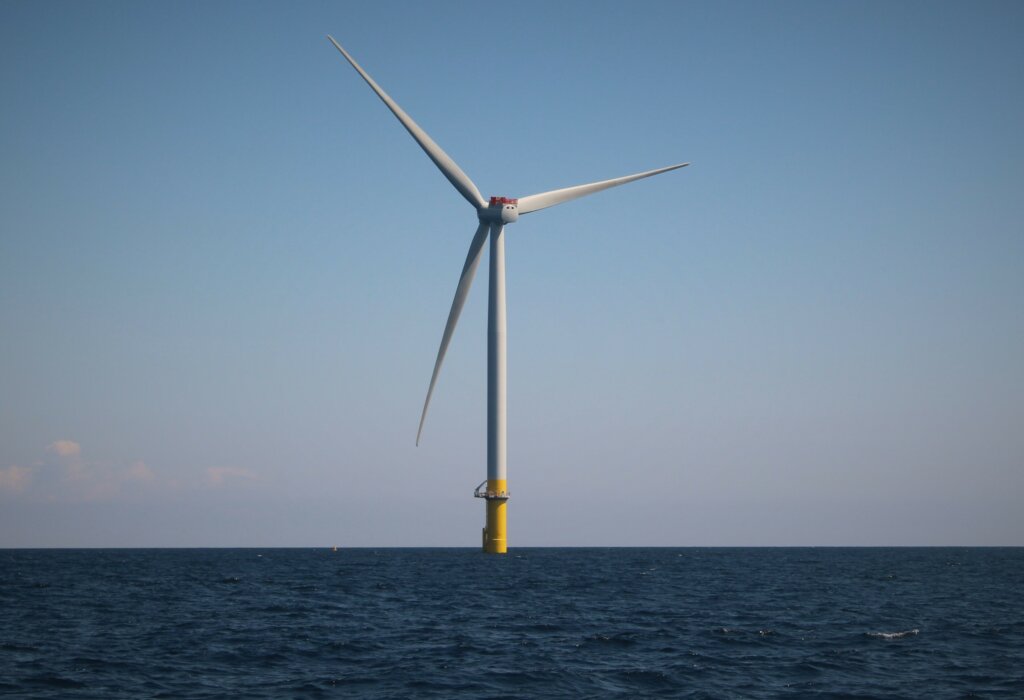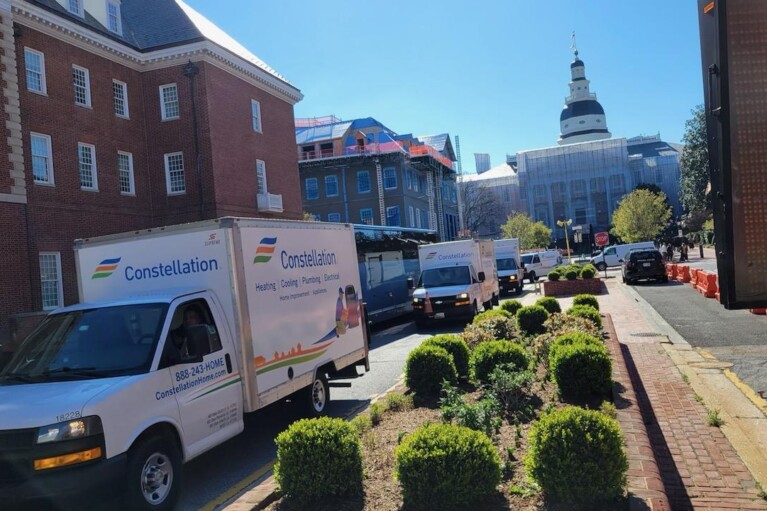Bill to expand state’s offshore wind energy economy has broad support — but it’s not a done deal

A bill that would expand the offshore wind energy industry in Maryland has been co-sponsored by more than half the members of a key House committee — including 13 of the panel’s 17 Democrats — and by the powerful chair of the Senate Committee on Education, Energy and the Environment. It aligns with the environmental and economic development priorities of the state’s new governor. It’s been endorsed by a robust coalition of business leaders, organized labor, environmental groups and others.
“This legislation is supported by labor, environmentalists, industry, small businesses, developers, justice advocates and consumer groups,” said Jamie DeMarco, the federal policy director for the Chesapeake Climate Action Network. “That has never happened before and we think it’s consequential.”
But in Annapolis, that’s no sure recipe for success.
Here’s how Bruce Bereano, one of the State House’s best-paid lobbyists and wiliest advocates, described the legislation.
“This is a very, very pregnant and serious bill that’s going to cost Maryland taxpayers a great deal of money,” he testified Monday before the House Economic Matters Committee, which is considering the measure.
Bereano is representing the mayor and city council members of Ocean City, who have a long history of opposing the offshore wind projects currently under development off the coast of Maryland’s top tourist destination. Ocean City’s concerns have been largely steamrolled during the years-long government debates over whether to allow wind turbines in federal waters off the Maryland coast. But introduce notes of complexity and cost into any legislative debate and the waters immediately become a little more muddied.
While the Promoting Offshore Wind Energy Resources (POWER) Act, introduced by Del. Lorig Charkoudian (D-Montgomery) and Sen. Katie Fry Hester (D-Howard), has several complexities — typical for any policy measure dealing with energy generation and distribution — the genesis of the bill and the concept behind it are fairly simple.
According to bill sponsors and advocates, Maryland was initially ahead of most states when it came to preparing for offshore wind development but has slowly fallen behind. Now, many neighboring states have allowed for more energy-generating capacity at federal lease sites, have done more to ensure that power generated offshore can connect to the electrical grid onshore, and have taken greater steps to boost the fledgling industry.
“Maryland started out as a real leader on offshore wind, back in 2011 and 2012 — first out of the gate,” Charkoudian told her colleagues at Monday’s hearing. “In the time since then, many of the East Coast states have leap-frogged over us. And if we want to benefit from the clean energy, the good union jobs and the [minority business] opportunities, we have got to act right now to put us back in this leadership position.”
While two offshore wind developers, Ørsted and US Wind, wait for final federal government approval to proceed with their projects near Ocean City and have begun to assemble production and maintenance facilities and workforces across the region, POWER Act supporters say the state needs to be doing more.
Offshore wind will need major investments in transmission, supply chain, reports say
The legislation lays out goals for expanding offshore wind power production in the state, sets guidelines for further developing a workforce in the industry, and directs the Maryland Public Service Commission, which regulates energy companies and utilities in the state, and the Department of General Services, which builds and maintains state-owned buildings and properties, to take several actions.
If enacted, the measure would:
-
Strengthen labor standards for offshore wind manufacturing, installation, and maintenance, ensuring that much of the workforce is unionized;
-
Set a goal for the state to generate 8.5 gigawatts of offshore wind by 2031, enough to power about 1.3 million homes. Maryland is currently building 2 gigawatts of offshore wind power;
-
Lease roughly 1 additional gigawatts of offshore wind power in existing federal lease areas.
-
Facilitate the construction of a shared transmission infrastructure that would bring the energy generated by the wind turbines onshore and connect it with the regional electric power grid.
It’s the final item that is potentially the most complicated and controversial. The two offshore wind companies setting up operations in Maryland have yet to find suitable landing spots onshore for their power generation — though they have been looking primarily in Delaware — and it’s unclear how and where the shared transmission infrastructure that the bill envisions would be set up.
Charkoudian said parts of the bill are modeled after New Jersey law, which has not only boosted its commitment to offshore wind power dramatically in recent years, but has also figured out ways to maximize its ability to connect the electricity generated at sea to the electric grid.
Joe DeLosa III, an energy consultant who formerly worked for the agency that regulates utilities in New Jersey, said the Maryland bill is written in such a way that increases the possibility of regional cooperation on transmission challenges from offshore wind.
“I would like to stress that time is of the essence,” he told lawmakers. “Further delays would lead the best entry points being used by early project developments.”
Although it wasn’t said at Monday’s hearing, some skeptics of the legislation have quietly suggested that the bill could lead to land being taken by eminent domain. And Bereano suggested Monday that the bill sponsors are envisioning a system that circumnavigates PJM, the regional grid operator that moves electric power around parts of 13 states and the District of Columbia — though bill supporters say that isn’t true.
Testifying for Gov. Wes Moore’s administration, Ryan Opsal, director of policy at the Maryland Energy Administration, said the administration fully supports the goals of the legislation, but has some reservations about the provisions in the bill to build out the remainder of the existing lease area in the Atlantic, especially when the federal government is expected to soon expand the amount of ocean area available for further offshore wind development.
Del. Andrea Harrison (D-Prince George’s), a member of the Economic Matters Committee, said it would “be awesome” if a section of the bill asking for a written report on the status of the measure’s provisions could include a look at how the legislation is meeting minority business participation goals.
“I’m really more interested in wealth creation and minority representation as opposed to just jobs,” she said.
Charkoudian replied that she was open to the suggestion and offered to “work together” to address her colleague’s concerns.
Besides Bereano representing Ocean City officials, the only other opposition to the bill at Monday’s hearing came from the Associated Builders and Contractors of Maryland. Michael Adams, a representative of the organization, said he and his colleagues objected to the language in the legislation that favors organized labor. He said the bill provides “a massive and unnecessary advantage when seeking this work.”
The road ahead
Proponents and detractors of the POWER Act will be back at it Tuesday afternoon, when the Senate Committee on Education, Energy and the Environment hears the bill. The committee chair, Sen. Brian Feldman (D-Montgomery), is a co-sponsor of the measure.
Bill supporters also have a news conference scheduled for just before the bill hearing, with the legislation’s sponsors, environmentalists, union leaders and a construction company slated to speak.
In the House, the bill has been assigned to two committees — Economic Matters and the Environment and Transportation Committee. Fourteen of the 17 Democrats on Economic Matters have sponsored the bill — though the chair, Del. C.T. Wilson (D-Charles), and the vice chair, Del. Brian Crosby (D-St. Mary’s), have not. Environment and Transportation Chair Kumar Barve (D-Montgomery) is also a sponsor of the legislation.
Crosby, who chairs the Economic Matters panel’s Public Utilities subcommittee, is expected to guide the committee debate on the legislation. But Wilson, in a brief interview Monday night, said he expected the bill to pass in some form.
“It’s not a bad bill,” he said. “I actually like it.”




 Creative Commons Attribution
Creative Commons Attribution